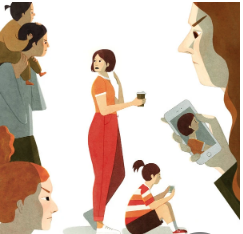Not your average Valentine’s Day bouquet of standard roses, this book offers a more creative delight to the senses. While the title may sound like another in the sea of mindfulness instruction manuals, it is something else entirely. Jenny Odell manages to invert how we experience our consciousness on quite a broader level. She pulls equally and effortlessly from ancient philosophy and modern art, to track the multitude of ways humans have been challenging the perimeters of perception for centuries. Certainly not your typical pop psych book, Odell is more historian and philosopher.
I find this book challenging to summarize as it is truly expansive and multifaceted. However, here are some of my favorite passages that highlight how “monoculture,” has corrupted and limited our individual imaginations.
“Just as practices of logging and large-scale farming decimate the land, an overemphasis on performance turns what was once a dense and thriving landscape of individual and communal thought into a Monsanto farm whose ‘production’ slowly destroys the soil until nothing more can grow. It extinguishes one species of thought after another, it hastens the erosion of attention.”
Odell asks very simply over and over, “productivity that produces what? Successful in what way, and for whom?” These are the questions she echoes throughout the book and ones I think we need to be asking ourselves far more often. I find that the most well-adjusted young adults I work with, were once teenagers and children who were given the freedom to explore these questions or to witness their parents doing so. But in a culture that pushes over-scheduling and a blind march towards the uniformity of college, these individuals are becoming more and more rare.
Without adults willing to ask these questions, the next generation is growing up blind to the influences that will narrow the development of their very identities. “When the language of advertising and personal branding enjoins you to ‘be yourself,’ what it really means is ‘be more yourself,’ where ‘yourself’ is a consistent and recognizable pattern of habits, desires and drives that can be more easily advertised to and appropriated, like units of capital.”
But Odell offers us hope, a way out beyond, “loudly quitting Facebook and then tweeting about it.” She suggests, “a real withdrawal of attention happens first and foremost in the mind…what is needed is not to just withdraw attention, but to invest it somewhere else, to enlarge and proliferate it, to improve its acuity.” She explores how resisting the attention economy means so much more than our individual battles with these forces, it ultimately will require social change and activism on a large scale. But for now, this book is a good place to begin.






